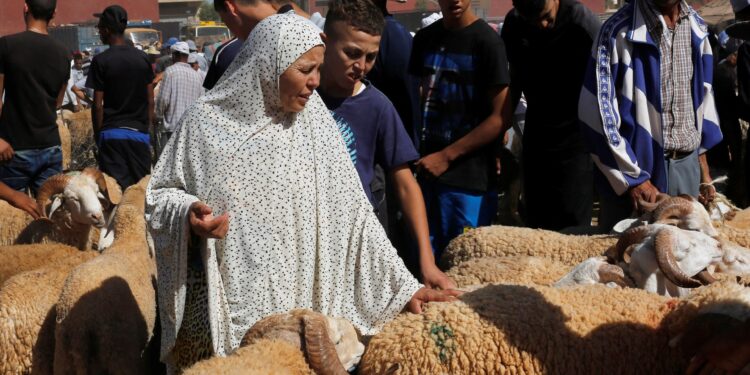The drought hitting Morocco – for the sixth year in a row – casts a shadow over the livestock sector, affecting the prices of Eid sacrifices in the Kingdom.
Although supply exceeds demand in the sector, according to Agriculture Minister Muhammad Seddiqi, families are afraid of the high prices of sacrifices for the current year, which prompted parliamentarians to warn that when supply exceeds demand, prices decline and not the other way around.
The supply of livestock in Morocco – during the current Eid Al-Adha – amounts to about 7.8 million heads, compared to 6 million requests, in addition to the government’s allocation of support to sheep importers.
According to livestock traders, sacrifices exceed 3,000 dirhams ($300) per head, while some other markets sell a kilo for between 65 dirhams ($6.5) and 83 dirhams ($8.3).
Supply exceeds demand
The Moroccan government is trying to reassure public opinion, due to news circulating about the rise in livestock prices as Eid al-Adha approaches.
In this context, the Minister of Agriculture said in a speech in the House of Representatives on May 20 that supply exceeds demand on the occasion of Eid al-Adha.
Minister Siddiqui added:
- The supply amounts to 7.8 million heads, of which 6.8 million heads are sheep, and the rest are goats.
- The demand is approximately 6 million, including 5.4 million heads, 81% of which are sheep and 19% of ewes, in addition to 600 thousand heads of goats.
- 34 temporary markets for Eid sacrifices were established and equipped nationwide, in coordination with local authorities to enhance the sheep marketing system.
For his part, Bihi Saeed, Projects and Cooperation Officer at the National Association of Sheep and Goat Breeders (non-governmental), says that sheep breeders and merchants have made an effort to prepare the sacrifices for this year.
Bayhi said in a statement to Anadolu Agency that “there is an abundance of sheep this year, and if there is a shortage, it will be slight,” adding that the state is working on balancing measures between demand and supply so that there is no significant price increase.
Drought takes its toll
Considered Moroccan Minister of Agriculture For the third year in a row, the livestock sector has been greatly affected by drought, which has caused a decline in vegetation cover, a decrease in crops, and an increase in the cost of fodder.
He pointed out that to confront these circumstances, the government established a program to support livestock breeders for the third year in a row to mitigate the effects of drought by continuing to support fodder and supply livestock.
Siddiqi said, “Due to the continuing drought, the government resorted to opening the door to imports on a temporary and exceptional basis, to increase the supply and contribute to preserving the national herd and stabilizing prices.”
Regarding the measures that facilitate the process of importing sheep, my friend spoke about “exempting the import of sheep from customs duties and value-added taxes, and granting support for the import of sheep destined for sacrifice at 500 dirhams ($50) per head between March 15 and June 15.”
He added, “The import has so far reached 220,000 heads, with the expectation that the import volume will reach 250,000 heads during the next two days, reaching 600,000 heads by the eve of Eid al-Adha.”
For the sixth year in a row, Morocco faces a real threat due to drought, amid risks facing the agricultural sector, which represents the backbone of the country’s gross domestic product.
High prices for sacrifices
Moroccan parliamentarians alerted to the high prices of Eid sacrifices, weeks before the Eid, the tenth day of the month of Dhu al-Hijjah 1445 AH, which is expected to fall on June 16, according to a document they distributed to journalists.
The document included questions they addressed to some ministries, such as Agriculture and Finance in the House of Representatives, in which the parliamentarians demanded the necessity of taking practical measures to monitor and protect purchasing power due to the wave of inflation that the Kingdom is experiencing and has extended to the sacrificial markets.
The parliamentarian for the Socialist Union Party, Mahdi Al-Fatimi, called for measures to be taken to reduce the prices of sacrifices, and said that there is a growth in complaints from a wide segment of Moroccans “as a result of the high cost of Eid sacrifices in the markets.”
The parliamentarian, Al-Rifa Maa Al-Ainin, from the parliamentary bloc of the Progress and Socialism Party, also called on the Ministry of Interior to intervene and confront all manifestations that contribute to the growing chaos and randomness that characterize some sacrificial markets.
As for the parliamentarian from the Popular Movement Party, Aziza Boujerida, she said, “Official statistics say that the supply of sheep and goats exceeds the demand, and this is the same thing that happened last season.”
She added, “When supply exceeds demand, prices decrease, which is something that did not happen during the past year,” and expressed her fear that it would “be repeated this year.”



